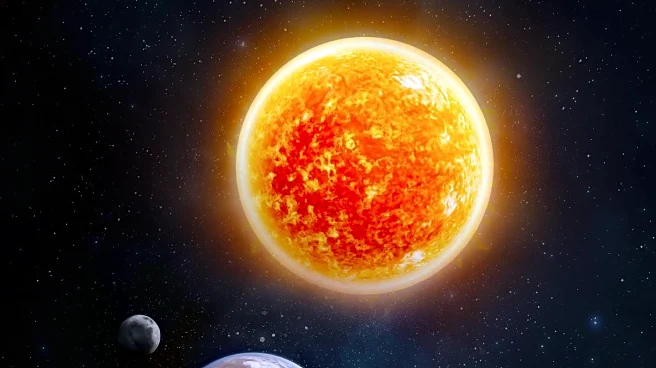What's Happening?
The last solar eclipse of 2025 is set to occur on the night of September 21, 2025. This partial solar eclipse will not be visible from India but can be observed in parts of Australia, Antarctica, the Pacific Ocean, and the Atlantic Ocean. During this celestial event, the Moon will pass between the Sun and Earth, partially obscuring the Sun. The eclipse will begin at 1:29 pm EDT and end at 5:53 pm EDT, with the maximum phase occurring at 3:41 am EDT. This event marks the second and final eclipse of the year, following a series of four eclipses in 2025, including two partial solar eclipses and two total lunar eclipses. The eclipse coincides with the autumnal equinox, a time when the Sun is directly above the equator, resulting in nearly equal day and night durations.
Why It's Important?
The solar eclipse is significant as it provides a unique opportunity for scientific observation and public engagement with astronomy. Eclipses have historically been important for understanding celestial mechanics and the dynamics of the solar system. For regions where the eclipse is visible, it offers a chance for educational outreach and public interest in space science. Additionally, the timing of the eclipse, just before the autumnal equinox, adds to its astronomical significance. While the eclipse will not be visible in the U.S., it highlights the global nature of such celestial events and the interconnectedness of scientific communities worldwide.
What's Next?
The next solar eclipses are scheduled for February 17 and August 12, 2026, although these will also not be visible from India. However, India will have the opportunity to witness a solar eclipse in August 2027. For those interested in observing future eclipses, planning travel to regions where they are visible can provide a unique experience. Scientific communities and amateur astronomers will continue to prepare for these events, using them as opportunities for research and public engagement.
Beyond the Headlines
Eclipses often carry cultural and religious significance in various societies. In India, specific practices and rituals are observed during eclipses, such as meditation, prayer, and the use of Kusha grass or Tulsi leaves to prevent food contamination. These practices reflect the deep cultural connections and beliefs associated with celestial events. Understanding these cultural dimensions can enhance appreciation for the diverse ways in which people around the world experience and interpret astronomical phenomena.











